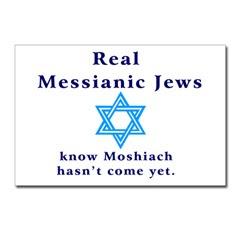
On the eve of Yom Kippur, the holiest day in the Jewish calendar, 'Jews for Jesus' is getting more and more aggressive in the drive to convert Jews to Christianity. According to internal memos from the proselytizing organization, missionaries are being directed to the Northern town of Qiryat Shemona. The memo goes on to boast that the missionaries "handed out 21,700 gospel tracts" and "have contact information of 995 Jewish people who told us that they want to know more about Jesus." 'Jews for Jesus' has about 2000 missionaries active in Israel. Just days ago, a radio ad by 'Jews for Jesus' in the Northern Galilee was blasted from the radio after protests. Irate listeners found that the message was far too aggressive in its call for Jews to accept Christianity.
'Jews for Jesus' is but one of close to a thousand missionary groups active in Israel. In the coming weeks, tens of thousands of Christian missionaries are expected to descend on Jerusalem for the annual Feast of Tabernacles Parade. The ICEJ, organizers of this mega-missionary event, claim that "the word of G-d (read 'Jesus') is preached nightly and is central to the evening meetings." Christians are entering a fever pitch, trying to get as many Jews as possible to become Christian. Sadly, many Jews who are unaffiliated, secular or have little knowledge of Judaism are succeptible to their tactics. These Messianic groups often claim that they represent authentic Judaism, albeit one that believes in Jesus as messiah. They believe themselves to be restoring the true message of the Torah.
This week's parsha of Haazinu tells us how to recognize authentic Judaism and to be able to spot out pseudo-Judaism. With many groups and individuals around the world passing off a fake, corrupted false Judaism as the real deal, this message is essential. "Remember the days of old, consider the years of many generations; ask thy father, and he will declare unto thee, thine elders, and they will tell thee." (Deut. 32:7) If a Jew is confused as to what is kosher and what is treif, he need only go back to his roots, to his traditions, to his parents, grandparents and great-grandparents. He must ask himself, "did my great-grandfather worship like this?" The Torah is clear about what happens when the Jews stray from the path of their ancestors. "They roused Him to jealousy with strange gods, with abominations did they provoke Him. They sacrificed unto demons, no-gods, gods that they knew not, new gods that came up of late, which your fathers dreaded not." (Deut. 32:16-17) Clearly, the Torah places emphasis on the fact that the Jews went after new gods which were recently invented. This is critical today. When confronted by missionaries who preach that Jews must believe in Jesus or be condemned to an eternity of hellfire, every Jew must take the Torah's warning to heart. Would his great-grandfather with his long beard and black hat sitting in a shtetl in the Pale of Settlement recognize his faith? His grandfather in the mellahs of Morocco? His ancestors in the judeiriahs of Spain? Would any of them recognize Jesus or feel comfortable at a Messianic service? Every Jew must answer back that Jesus and the Christian theology is 'a new god that came up of late, which our fathers dreaded not'. If a Messianic were to stand in a room with a Rambam, a Rashi, a Rabbi Akivah, a Baal Shem Tov, a Vilna Gaon, a Ramban, or even a Moshe Rabeinu, he would not fit in. They would not see any resemblance between their Judaism and the counterfeit junk hawked by the apostate.
The Kol Nidrei prayer on Yom Kippur night awakens within every Jew the desire to come home to HaShem, to do teshuva and to be faithful to what they really are. It gained special significance during the time of the Spanish Inquisition when Jews were forced on pain of death to take vows and abandon Judaism. Kol Nidrei became their way of renouncing any vows they were forced to take by the Church. The knew at heart that they were Jews.
When the American forces reached the Buchenwald death camp, they opened the gates of the camp wide and liberated the inmates. The prisoners left the camp and dispersed, each going his own way. Reb Leizer of Czen-sto-chow was one of the freed inmates. At the gate he paused. "Where? Where should I go?" He knew that most everyone in his family had been murdered. They came with him to the camp, and he saw them led to the crematoria.
Only one hope remained. As all of the people of the town were being herded together for shipment to the death camp, he was able to smuggle his little son Yossele out of the ghetto and into the "Aryan" section of town. "Who knows?" said Reb Leizer to himself, "Perhaps the child is still alive, still alive." He would go looking for him. But how, where?
Reb Leizer went back to Czen-sto-chow. He wandered about the streets and the marketplaces, and every time he saw a boy about Yossele's age, he would stop and look at him closely. Perhaps this was his son. He began asking guardedly, "Did anybody know the Leizer family, or what happened to them?" People told him that the family had left the town in the death trains, everyone except the little boy, whom someone took to the monastery. Which monastery? No one knew. "If my son is alive," decided Reb Leizer, "I will save him."
He went from one monastery to the next, inquiring about his son. The monks denied ever seeing him. No Jewish child, they claimed, had ever crossed the threshold of a monastery. Reb Leizer knew they were lying, but what could he do? He went and bought an organ. Among the tunes he put into it was the melody of Kol Nidre. Reb Leizer strapped the organ to his back and began making the rounds of the streets and yards from village to village, from one monastery to the next. Wherever he saw children playing, he would set the organ down on its legs and begin turning the handle. Immediately he would be surrounded by children. As the children stood listening, he would watch their faces closely – particularly when the organ ground out the tune of Kol Nidre.
Did any child's face change or show some emotion – fear, perhaps, or sadness and longing? Whenever he saw a child stir as the Kol Nidre melody was played, he knew that child was Jewish. As all the other children scattered, he would follow this child, talk to him, and tell him that the war was over and he could go back to his own people. Though unable to find Yossele, history records that he was able to save scores of Jewish children and restore them to their faith, with possibly the most moving tune of our faith.
Reb Leizer took his organ and buried it in the ruins of a destroyed synagogue and he went to Israel. People from that district of Poland say that at times they hear the tunes of a hand organ coming out of the earth, and among the tunes is the melody of Kol Nidre.
On the eve of Yom Kippur, I pray that HaShem merit that the beautiful and moving melody of Kol Nidrei stir the heart of every single Jew to return to his Father in Heaven. Before we begin the Kol Nidrei service, we say that by the permission of the Heavenly and earthly courts, it is permissible to pray with sinners and transgressors. On Yom Kippur, all Jews are welcome before HaShem. We must remember who we really are and not let any dastardly peddler of false beliefs lead us astray. May every single lost Jewish child return home. Gmar chatima tovah.




1 comment:
Very thoughtfull post on "Remember who you are".If you are looking for non profit fund raising tap into an established, successful, and proven Fundraising Program that works @ http://debtfreeliving.supportnonprofits.com
Thanks,
Edwin- Fund raising that really works
Post a Comment